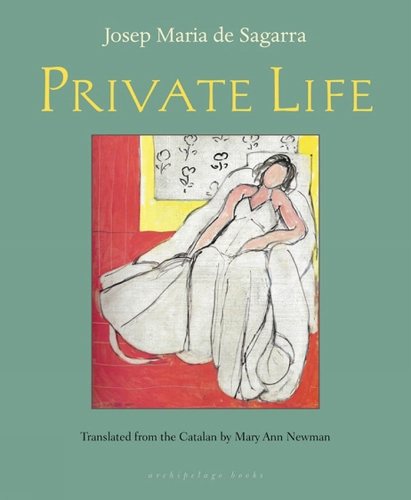
Private Life
(Paperback)
Publishing Details
Private Life
By (Author) Josep Maria de Sagarra
Translated by Mary Ann Newman
Archipelago Books
Archipelago Books
15th September 2015
United States
Classifications
General
Fiction
Fiction in translation
849.9352
Physical Properties
Paperback
496
Width 146mm, Height 177mm
553g
Description
In 1932 Josep Maria de Sagarra set out to write the great Catalonian novel, an urban antidote to the rural tales and timid missives about folk customs that had previously prevailed in the Catalonian literature. Private Life was the result: a scathing critique of the decadent and disappearing aristocratic classes hailing from the region. Sagarra's evisceration of the upper classes was both ruthless and thorough - the impact of their behaviour on everyone from their own kin to the street sweepers they brush past painstakingly chronicled in this volume.
Reviews
"[A] satirical, multigenerational saga about the intricate relationship between Barcelona's fading aristocracy and the city's sordid demimonde...Expect murder, revenge, and fallings in and out of love ... The novel comes most alive when the author digresses from his plot: in his characters' back stories, his ruminations on Spain's socioeconomics, his cleverly vicious bons mots and descriptions ... and in some surprisingly graphic sex... In this casual, colloquial translation, Barcelona between the wars is full of tawdry vitality, much like the novel itself." Kirkus Reviews (Starred Review)
"Sagarras evocation of the crumbling upperclassBarcelonan milieu is intricate and panoramic,and the reader views the plot in perspective,as a single sequence of occurrencesamong many others in this social historymasquerading as a novel...thisbook makes a much-needed contribution tocontemporary letters." Rain Taxi Review of Books
"One might compare Sagarras Private Life to Hemingway, Camus, Flaubert, or Proust, whose wealthy, bourgeois, narcissistic characters illustrate moral ineptitude. Newmans choices in language for this translation indeed direct the English-speaking literary world to view the upper classes of the early twentieth century as the character Frederic is described, possessing 'all his banality and moral inconsistency.'Sagarras novel deserves a position in the literary canon of twentieth-century Europe, and Newmans new translation will certainly boost its chances." World Literature Today
"Sagarra achieves a striking contrastbetween this rich prose and his sordid content.Mary Ann Newman has translated adifficult book with finesse and imagination... Private Life bubbles over with insightand malice. Some time after its publication,Sagarra said wickedly, Compared with reality,its just a mild romantic novel. It is not akindly book, but a flawed classic with wonderfulenergy and memorable charactersand did that parasite class deserve kindness" The Literary Review(UK)
"Sagarra plays with the reader, never going where he seems to be heading, presenting a huge, sprawling patchwork fitted together into a mosaic of the end of the aristocratic age. In lusciously exact language, Sagarra painstakingly charts the misunderstandings and crossed signals of privileged human beings greedily, selfishly determined to be happy." Nick DiMartino, University Book Store, in Shelf Awareness
A "graphic and viciously funny Catalan social satire... This is a risqu novel, sustained by humor and a sleazy elegance, all steeped in ironies...[A] human comedy in the style of Balzac... far racier than Dickens, although Sagarra certainly has the Victorians flair for creating characters...a sprawling soap opera writ large [that] has a contemporary feel." The Irish Times
"[F]unny and ridiculous,de Sagarra paints a meticulous portraitof the dawn of modernity inCatalonia." Publishers Weekly
"Arich tapestry...What really makesPrivate Lifea compelling read are Sagarras vivid details of this crumbling society and his keen observations about it...thanks to Mary Ann Newman and her sparkling translation, Sagarras masterpiece is finally available in English." Open Letter,Three Percent
"[Vida Privada] is a portrait of the "great world" of Barcelona and its loyalties in the years that preceded the Republic and in the early days of the new regime. Rigorous contemporaneity, stylistic effective
Author Bio
Josep Maria de Sagarra (1894-1961) -- Catalan Balzac, journalist, theater critic, translator, poet, and novelist -- was a force of nature who produced volumes of poetry, drama, essays, and three major novels, which have made him one of the most popular and loved voices of Catalan literature. After winning his first poetry prize in the Juegos Florales, he decided to devote his life to literature. His translated works include Dante's Divine Comedy and plays by Shakepespeare, Moli re, and Gogol. He was a member of the Institute of Catalan Studies, the Academy of Letters, the General Council of Authors of Spain, and the council of the Grand Cross of the Civil Order of Alfonso X the Wise. Mary Ann Newman is the former Director of the Catalan Center at New York University, which was an affiliate of the Institut Ramon Llull, and a member of the board of The Catalan Institute of America. She is a translator, editor, and occasional writer on Catalan culture. In addition to Sagarra, she has translated works by Quim Monz , Xavier Rubert de Vent s, Joan Maragall, and Narcis Comadira, among others.
